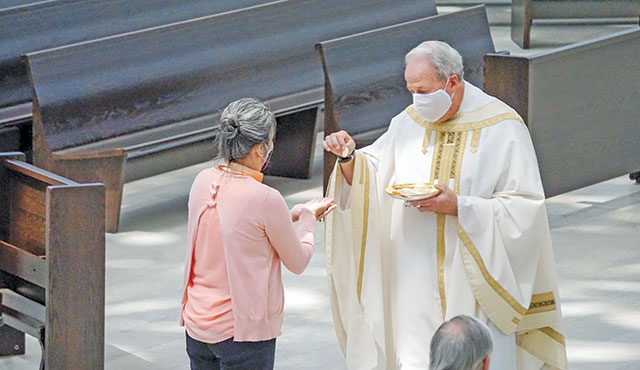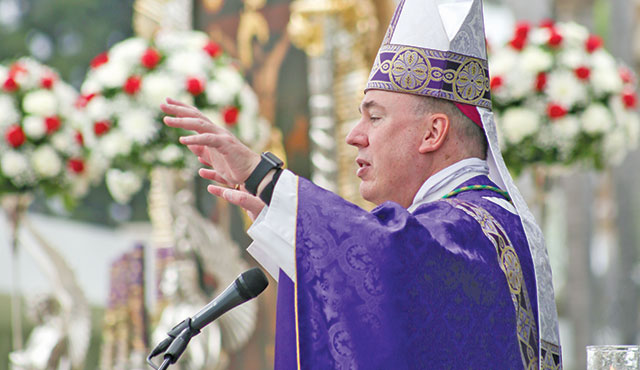The beginning of a new year is an opportunity that many popularly use to evaluate health, fitness, career, financial, academic or relationship goals and propose resolutions to achieve them. For Catholics, perhaps it can also be a time to reflect on our obligations, identify areas that need improvement and create a plan to grow deeper in our faith.
The Catechism of the Catholic Church guides the specifics of being a Catholic in good standing and lays out five concrete obligations called the Precepts of the Church (CCC, 2041-2043). Older versions of the Catechism included two additional precepts:
- Attend Mass on Sundays and holy days of obligation.
- Confess sins at least once a year.
- Receive the sacrament of the Eucharist at least during the Easter season.
- Observe the days of fasting and abstinence established by the Church.
- Help provide the needs of the Church according to his ability.
- Observe the Church’s laws on marriage.
- Participate in the Church’s mission of evangelization.
Despite the regional stay-at-home orders in California, Catholics can continue to fulfill these obligations. Parishes throughout the Diocese of Orange have made adjustments in the last year to offer outdoor confession and Masses. A complete list of these services, as well as livestream Mass and adoration schedules at a parish near you, are available on the diocesan homepage at rcbo.org.
Father Christopher Smith, rector and episcopal vicar to Christ Cathedral, offers three additional parts that are also essential and challenge Catholics to live their faith.
“It’s important that Catholics understand that living our faith is not just about obligations,” he said. “It’s about living a good and moral life that is consistent with the teachings of Jesus Christ as taught through the Catholic Church.”
He says the best example from a scriptural point of view of living a Christian and Catholic life, is found in chapter 5 of the book of Matthew. This particular scripture begins with Jesus teaching his disciples the Beatitudes in the Sermon on the Mount and culminates with “love your enemies and pray for those who persecute you.”
Jesus gives us a tall order to fulfill.
“Another part of this is that Catholics are expected to be aware of the social teachings of the Catholic Church,” explains Father Smith. “The social teachings of the Catholic Church begin with the foundation that all people are created in the image of God and therefore all human persons have dignity. So, because all human persons have dignity as being created in the image of God, the Church teaches that all people have certain rights to that which we need to grow as human beings. Those are the rights to food, clothing, shelter, education, healthcare and gainful employment.”
The third part is the Catholic Church’s social teaching called the “preferential option for the poor.”
“That means that we are called to measure everything we do as Catholics by what we’re doing to serve those who have the least,” said Father Smith. “As an example, during these times, is that for some people it is possible to give assistance to people who are in need, who don’t have enough food or clothing. People can also volunteer in grocery distributions or support financial efforts to help those who are struggling financially. Those all touch on the points of feeding the hungry, clothing the naked, and all those things that Jesus talks about in other parts of the gospels.”
So in 2021, how can one become better at living a Catholic life?
One step at a time.
Like a good fitness plan for improving your health or a financial plan toward reducing debt, consider creating a plan to improve your Catholic faith life. The Cathedral Gift shop on the Christ Cathedral campus and most online shops offer a variety of beautiful Catholic planners with a liturgical calendar to help you organize important dates and remind you of Catholic obligations.
Reading scriptures and praying daily are essential to growing a deeper relationship with God. If it helps with being consistent, consider adding those two items to your planner, daily to-do list or to your favorite app that sends reminder notifications to your phone.
Also, consider joining online groups that will help you connect with other Catholics during this time. Don’t do it alone. Although there are many nationally established online Catholic communities, visit your local parish website first. Many parishes have shifted to offer virtual Bible studies, small group ministry discussions and classes that help to connect Catholics with similar desires to grow in their faith.
Your local parish website is also one of many resources and is a good place to start to find information on opportunities to give to the poor or volunteer your time and skills to programs that provide food, healthcare, shelter, education or employment to the poor.
Creating a plan at the beginning of the year is a helpful tool that will help you visually see your journey as you aspire to grow in your Catholic faith.


